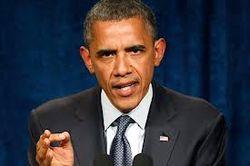Misunderstanding, misstatements and all the classic contortions of partisan message management
surround the sequester, the term for the $85 billion in ugly and largely irrational federal spending cuts set by law to begin Friday.
What is the non-budget wonk to make of this? Who is responsible? What really happened?
The finger-pointing began during the third presidential debate last fall, on Oct. 22, when President Obama blamed Congress. “The sequester is not something that I’ve proposed,” Obama said. “It is something that Congress has proposed.”
The White House chief of staff at the time, Jack Lew, who had been budget director during the negotiations that set up the sequester in 2011, backed up the president two days later.
“There was an insistence on the part of Republicans in Congress for there to be some automatic trigger,” Lew said while campaigning in Florida. It “was very much rooted in the Republican congressional insistence that there be an automatic measure.”
The president and Lew had this wrong. My extensive reporting for my book “The Price of Politics” shows that the automatic spending cuts were initiated by the White House and were the brainchild of Lew and White House congressional relations chief Rob Nabors — probably the foremost experts on budget issues in the senior ranks of the federal government.
Obama personally approved of the plan for Lew and Nabors to propose the sequester to Senate Majority Leader Harry Reid (D-Nev.). They did so at 2:30 p.m. July 27, 2011, according to interviews with two senior White House aides who were directly involved.
Nabors has told others that they checked with the president before going to see Reid. A mandatory sequester was the only action-forcing mechanism they could devise. Nabors has said, “We didn’t actually think it would be that hard to convince them” — Reid and the Republicans — to adopt the sequester. “It really was the only thing we had. There was not a lot of other options left on the table.”
A majority of Republicans did vote for the Budget Control Act that summer, which included the sequester. Key Republican staffers said they didn’t even initially know what a sequester was — because the concept stemmed from the budget wars of the 1980s, when they were not in government.
At the Feb. 13 Senate Finance Committee hearing on Lew’s nomination to become Treasury secretary, Sen. Richard Burr (R-N.C.) asked Lew about the account in my book: “Woodward credits you with originating the plan for sequestration. Was he right or wrong?”
“It’s a little more complicated than that,” Lew responded, “and even in his account, it was a little more complicated than that. We were in a negotiation where the failure would have meant the default of the government of the United States.”
“Did you make the suggestion?” Burr asked.
“Well, what I did was said that with all other options closed, we needed to look for an option where we could agree on how to resolve our differences. And we went back to the 1984 plan that Senator [Phil] Gramm and Senator [Warren] Rudman worked on and said that that would be a basis for having a consequence that would be so unacceptable to everyone that we would be able to get action.”
In other words, yes.
We are less than a week away from invoking that which no one thought we would. And there will be many paying the price for the inability of this President and this Congress to do that for which they were elected.
Only in today's America will the people suffer when the political elites fail to do their jobs.
 surround the sequester, the term for the $85 billion in ugly and largely irrational federal spending cuts set by law to begin Friday.
surround the sequester, the term for the $85 billion in ugly and largely irrational federal spending cuts set by law to begin Friday.